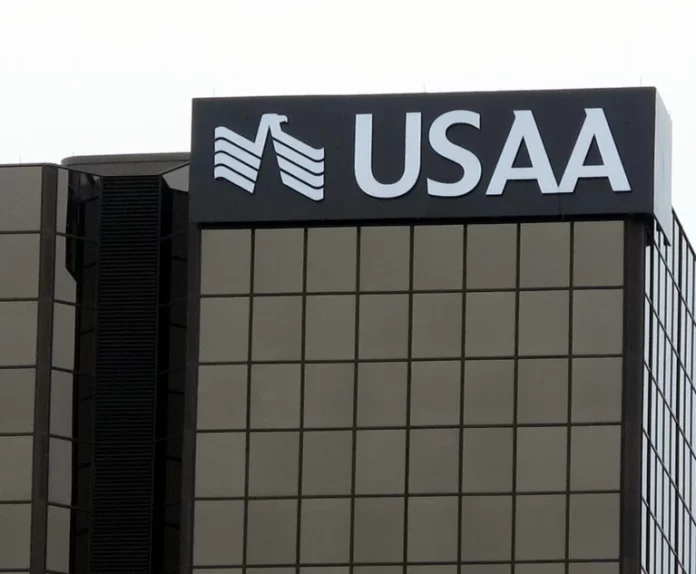
Key Takeaways:
- Verdict Shockwave: A Nevada jury hits USAA with a staggering $100 million punitive damages award, plus $14 million in compensatory damages, over bad faith handling of a car accident claim.
- Shifting Blame Backfires: USAA initially deemed their insured client not at fault, then argued in court that he was responsible, leading to accusations of breaching their obligations.
- Wake-Up Call to Insurers: Attorneys for the plaintiff hope this massive verdict will force insurance companies to reconsider how they treat their own insured clients.
By Samuel A. Lopez – USA Herald
A Nevada state court jury has delivered a stinging rebuke to USAA, hitting the insurance giant with a $100 million punitive damages verdict in a bad faith lawsuit. The case centered on USAA’s handling of a claim filed by their insured driver, Timothy Kuhn, who was involved in a rear-end collision. In addition to the massive punitive award, the Clark County jury awarded Kuhn $14 million in compensatory damages, bringing the total judgment against USAA to $114 million. The verdict highlights the potential consequences for insurers who allegedly prioritize minimizing payouts over fairly serving their own policyholders.
The case stems from a 2018 accident in which Kuhn was rear-ended while stopped in highway traffic. USAA initially determined that Kuhn was not at fault. However, the situation took a turn when Kuhn sued the at-fault driver to recover damages for a concussion he sustained in the crash. USAA then intervened in the lawsuit, arguing that Kuhn was actually responsible for the accident – a move that became the crux of the bad faith claim.
Kuhn subsequently amended his lawsuit to include claims against USAA, alleging that the insurer had breached its obligations to him by contradicting their initial assessment and arguing that he caused the accident. USAA, in its defense, maintained that Kuhn’s head injury was not as severe as he claimed and that the time taken to arrive at a $250,000 policy limit payout offer – made on the eve of trial – reflected the complexity of the claim, not bad faith.
While Kuhn recovered relatively quickly from neck and back injuries, his attorneys presented evidence that he suffered from traumatic brain injury symptoms and incurred substantial medical bills as he consulted with neurologists across the country.
According to Kuhn’s legal team, the other driver’s insurer paid its policy limit, and a similar payout from USAA after acknowledging their client was not at fault would have resolved the matter. However, USAA reportedly offered only $10,000 initially, a figure that Kuhn’s attorneys found “baffling.”
“We are still at a loss of why USAA did not resolve this earlier, other than them thinking that they could get by on their reputation,” said Joshua Berrett of Bighorn Law, one of the attorneys representing Kuhn, after the trial.
Berrett noted that his firm frequently sees insurers intervening on behalf of at-fault drivers to reduce the damages owed to their own insured – a practice he believes violates their duty of good faith. “They seem to lose sight of the duties they owe to their own insured and just do everything they can to minimize the amount they have to pay on the claim,” he stated.
A USAA spokesperson said that the company respectfully disagrees with the verdict and does not believe it is supported by the evidence presented at trial. “We will evaluate our legal options and continue to focus on our century-long commitment to serving our members,” the spokesperson said.
Berrett indicated that while his team was unable to speak with jurors after the trial, he believes that USAA’s late policy limit payout offer, coupled with their denial that Kuhn suffered a brain injury, negatively impacted the jury. He further contended that USAA’s decision to call expert witnesses who downplayed Kuhn’s injury, despite what Berrett characterized as significant medical evidence, was not well-received.
“The fact that USAA put these experts on the stand after knowing these issues was not received well by the jury, and it demonstrated that USAA was not putting Tim’s interest equal to that of USAA and was not searching for evidence to support Tim’s claim,” Berrett explained.
While USAA suggested that the eventual policy limit payout offer demonstrated their good faith, Berrett speculated it may have backfired. “They could not come up with a coherent, reasonable explanation of why they paid the limits after so many years of refusing to do so, especially since they were saying the claim was still worth less than the limits even at trial,” he said.
Berrett further lamented that this outcome stemmed from USAA’s standard procedures, rather than an isolated incident of overzealous adjusting, suggesting a broader industry issue of insurers undervaluing legitimate claims.
“We think the adjuster did exactly what she had been trained to do,” he said. “The evidence indicated that the bills were run through the same system that USAA uses for all of their claims, which resulted in arbitrary reduction of the medical bills.”
Berrett expressed hope that verdicts like this will serve as a wake-up call to insurers engaging in similar practices. “We hope that this verdict will get insurance companies to stop treating their own insureds like they are the adverse party and start considering the interest of the insureds, like they are supposed to,” he concluded.
Kuhn was also represented by Kimball Jones and Emily Gable of Bighorn Law.
The defense was represented by DKM Law Group and Lewis Brisbois.
In re: Timothy Kuhn v. Hector Cervantes-Andrade, case number A-20-821602-C in Clark County, Nevada.


